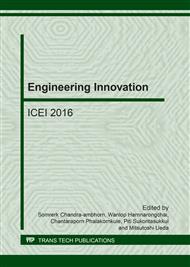p.215
p.223
p.229
p.235
p.240
p.246
p.252
p.258
p.264
Mechanical Properties of Composite Compounded with ABS (GF) and CF by DFFIM
Abstract:
The direct fiber feeding injection molding (DFFIM) process is the new fabrication technique. This technique is able to eliminate the compounding process. In this study, the composite consisting of glass fiber/carbon fiber/ABS (GF/CF/ABS) were fabricated. Tensile, bending and Izod impact test were conducted to compare mechanical properties between glass fiber and glass fiber/carbon fiber hybrid composites. The additional of carbon fiber improved tensile, bending and impact properties of the hybrid composites. SEM photographs indicated that carbon fiber tended to agglomerate during DFFIM process. It can be noted that the low content of carbon fiber was suitable for enhanced mechanical performances of GF/CF/ABS hybrid composites.
Info:
Periodical:
Pages:
240-245
DOI:
Citation:
Online since:
January 2017
Price:
Сopyright:
© 2017 Trans Tech Publications Ltd. All Rights Reserved
Share:
Citation:


